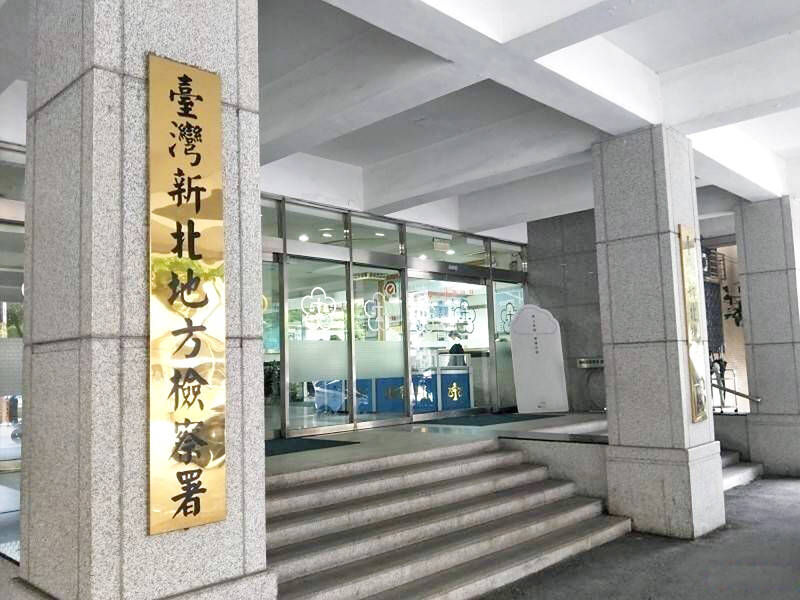Public prosecutors yesterday indicted a Taiwanese and a Chinese national on charges of funneling money from Chinese sources to fund a Labor Party candidate running for New Taipei City councilor in 2022’s local elections.
New Taipei City prosecutors charged Sun Chih-chuan (孫志全), deputy chairman of the Taiwan-based Chinese Youth Development Union, and Dong Dachi (董笪琦), a Chinese executive at the Federation of Hong Kong Jiangsu Youth, with contravening the Anti-Infiltration Act (反滲透法) and the Political Donations Act (政治獻金法).
Evidence indicated that Sun and Dong, using a complex route to hide the Chinese source of funding, transferred about NT$430,000 to fund the election campaign of Wang Cheng (王正), the pro-China unification Labor Party candidate, prosecutors said in a filing.

Photo: Wang Ting-chuan, Taipei Times
Sun and Dong are listed as suspects who allegedly made illegal election donations, promoted infiltration by foreign hostile forces (usually referred to as those based in China and Hong Kong), worked to subvert Taiwan’s national security and social stability, and undermined Taiwan’s sovereignty and democratic constitutional order, as stipulated in the Anti-Infiltration Act.
Prosecutors have also filed separate charges against Wang and his sister Wang Li (王立), accusing them of breaching the Political Donations Act by facilitating and accepting money from Chinese sources.
An investigation showed that Sun and Dong allegedly colluded to transfer 100,000 yuan (US$13,895 at the current exchange rate) in September 2022, with the money coming from Sun’s father-in-law, who owns a trading company. The money was listed on the company’s books as payment for procurement of chemical materials, but it went to Dong’s bank account in Hong Kong. Dong then wired the money to Wang Li to fund for her brother’s election campaign, investigators said.

Alain Robert, known as the "French Spider-Man," praised Alex Honnold as exceptionally well-prepared after the US climber completed a free solo ascent of Taipei 101 yesterday. Robert said Honnold's ascent of the 508m-tall skyscraper in just more than one-and-a-half hours without using safety ropes or equipment was a remarkable achievement. "This is my life," he said in an interview conducted in French, adding that he liked the feeling of being "on the edge of danger." The 63-year-old Frenchman climbed Taipei 101 using ropes in December 2004, taking about four hours to reach the top. On a one-to-10 scale of difficulty, Robert said Taipei 101

Nipah virus infection is to be officially listed as a category 5 notifiable infectious disease in Taiwan in March, while clinical treatment guidelines are being formulated, the Centers for Disease Control (CDC) said yesterday. With Nipah infections being reported in other countries and considering its relatively high fatality rate, the centers on Jan. 16 announced that it would be listed as a notifiable infectious disease to bolster the nation’s systematic early warning system and increase public awareness, the CDC said. Bangladesh reported four fatal cases last year in separate districts, with three linked to raw date palm sap consumption, CDC Epidemic Intelligence

Taiwanese and US defense groups are collaborating to introduce deployable, semi-autonomous manufacturing systems for drones and components in a boost to the nation’s supply chain resilience. Taiwan’s G-Tech Optroelectronics Corp subsidiary GTOC and the US’ Aerkomm Inc on Friday announced an agreement with fellow US-based Firestorm Lab to adopt the latter’s xCell, a technology featuring 3D printers fitted in 6.1m container units. The systems enable aerial platforms and parts to be produced in high volumes from dispersed nodes capable of rapid redeployment, to minimize the risk of enemy strikes and to meet field requirements, they said. Firestorm chief technology officer Ian Muceus said

MORE FALL: An investigation into one of Xi’s key cronies, part of a broader ‘anti-corruption’ drive, indicates that he might have a deep distrust in the military, an expert said China’s latest military purge underscores systemic risks in its shift from collective leadership to sole rule under Chinese President Xi Jinping (習近平), and could disrupt its chain of command and military capabilities, a national security official said yesterday. If decisionmaking within the Chinese Communist Party has become “irrational” under one-man rule, the Taiwan Strait and the regional situation must be approached with extreme caution, given unforeseen risks, they added. The anonymous official made the remarks as China’s Central Military Commission Vice Chairman Zhang Youxia (張又俠) and Joint Staff Department Chief of Staff Liu Zhenli (劉振立) were reportedly being investigated for suspected “serious